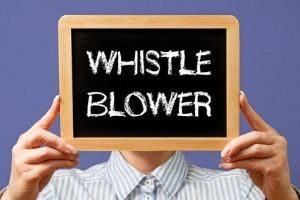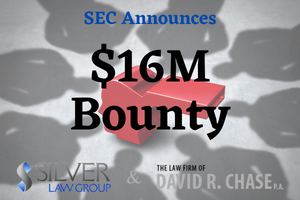 Earlier this year, rumors circulated that the U.S. Securities and Exchange Commission is investigating cryptocurrency exchange Coinbase Global Inc. In July of 2022, the U.S. Securities and Exchange Commission began a probe into whether Coinbase improperly allowed Americans to trade digital assets that should have been registered as securities. Continue reading
Earlier this year, rumors circulated that the U.S. Securities and Exchange Commission is investigating cryptocurrency exchange Coinbase Global Inc. In July of 2022, the U.S. Securities and Exchange Commission began a probe into whether Coinbase improperly allowed Americans to trade digital assets that should have been registered as securities. Continue reading
Articles Posted in SEC Whistleblower
Blowing The Whistle On Twitter: The Legal Implications (Part 2)
 Twitter has been in the news quite a bit this year, and, in this case, not all publicity is good publicity. In August of 2022, the Washington Post and CNN gained access to a whistleblower report alleging mismanagement, spying, and security concerns at Twitter. The report came from Peiter “Mudge” Zatko, the company’s former head of security and noted hacker and cybersecurity expert. Zatko filed the whistleblower report with the U.S. Department of Justice and the U.S. Securities and Exchange Commission. Continue reading
Twitter has been in the news quite a bit this year, and, in this case, not all publicity is good publicity. In August of 2022, the Washington Post and CNN gained access to a whistleblower report alleging mismanagement, spying, and security concerns at Twitter. The report came from Peiter “Mudge” Zatko, the company’s former head of security and noted hacker and cybersecurity expert. Zatko filed the whistleblower report with the U.S. Department of Justice and the U.S. Securities and Exchange Commission. Continue reading
The Twitter Whistleblower (Part I)
 In August, CNN published an expose detailing accusations from a whistleblower that social media giant Twitter misled its board and U.S. Securities and Exchange Commission regulators about security vulnerabilities on its platform. The news has been explosive. The whistleblower is Peiter Zatko, Twitter’s former head of security and a noted cybersecurity expert. But Twitter fired Zatko in early 2022. Continue reading
In August, CNN published an expose detailing accusations from a whistleblower that social media giant Twitter misled its board and U.S. Securities and Exchange Commission regulators about security vulnerabilities on its platform. The news has been explosive. The whistleblower is Peiter Zatko, Twitter’s former head of security and a noted cybersecurity expert. But Twitter fired Zatko in early 2022. Continue reading
SEC Cranks Up Insider Trading Cases
 The U.S. Securities and Exchange Commission has recently ratcheted up enforcement of insider trading cases, announcing investigations against ten people in four different cases in July. The headline-grabbing case involves a former Coinbase manager, his brother, and a friend alleging a scheme to trade the cryptocurrency ahead of announcements that crypto assets would be available for trading. Continue reading
The U.S. Securities and Exchange Commission has recently ratcheted up enforcement of insider trading cases, announcing investigations against ten people in four different cases in July. The headline-grabbing case involves a former Coinbase manager, his brother, and a friend alleging a scheme to trade the cryptocurrency ahead of announcements that crypto assets would be available for trading. Continue reading
Companies Under Pressure To Commit Securities Fraud
 We hear about securities fraud when a big case comes along. Hollywood often mythologizes the topic in movies like The Wolf of Wall Street. But these headline-grabbing stories don’t tell the full story. Companies are often under immense pressure to meet market expectations.
We hear about securities fraud when a big case comes along. Hollywood often mythologizes the topic in movies like The Wolf of Wall Street. But these headline-grabbing stories don’t tell the full story. Companies are often under immense pressure to meet market expectations.
On the Bloomberg Law podcast, UCLA Law School professor James Park recently discussed his new book “The Valuation Treadmill: How Securities Fraud Threatens the Integrity of Public Companies.” The book covers the pressures that U.S. companies face to commit securities fraud. Continue reading
Fraudulent Sales Pitches By Stockbrokers
 When the Securities and Exchange Commission (SEC) warns investors of types of investment scams—such as boiler room and Ponzi schemes—the agency routinely mentions the high-pressure aggressive sales tactics scammers rely on to help defraud their customers. So let’s look at some techniques that fraudsters are using: Continue reading
When the Securities and Exchange Commission (SEC) warns investors of types of investment scams—such as boiler room and Ponzi schemes—the agency routinely mentions the high-pressure aggressive sales tactics scammers rely on to help defraud their customers. So let’s look at some techniques that fraudsters are using: Continue reading
Tech Insiders Are Coming Forward As SEC Whistleblowers
 As reported in the Wall Street Journal, employees of tech companies in Silicon Valley and elsewhere are increasingly coming forward to the Securities and Exchange Commission (SEC). These employees-turned-SEC whistleblowers are explaining how their companies are overpromising and underdelivering or otherwise violating the federal securities laws. Continue reading
As reported in the Wall Street Journal, employees of tech companies in Silicon Valley and elsewhere are increasingly coming forward to the Securities and Exchange Commission (SEC). These employees-turned-SEC whistleblowers are explaining how their companies are overpromising and underdelivering or otherwise violating the federal securities laws. Continue reading
Life Settlement Funds— Defrauding Seniors And Investors
 In recent years, many investors have been looking for new ways to invest. One way funds have been doing that is by pooling a type of asset or debt into an investment fund. Ownership of the pool is sold as shares, with profits to be allocated between the shareholders if the pool’s assets increase in value. One such category of these pooled asset investments is “life settlement funds,” but the Securities and Exchange Commission (SEC) and others are warning that many of these funds are a scam. Continue reading
In recent years, many investors have been looking for new ways to invest. One way funds have been doing that is by pooling a type of asset or debt into an investment fund. Ownership of the pool is sold as shares, with profits to be allocated between the shareholders if the pool’s assets increase in value. One such category of these pooled asset investments is “life settlement funds,” but the Securities and Exchange Commission (SEC) and others are warning that many of these funds are a scam. Continue reading
SEC Amends Rules To Whistleblower Program
 The SEC recently announced two amendments to their Whistleblower program rules that will make coming forward a little more lucrative for interested individuals.
The SEC recently announced two amendments to their Whistleblower program rules that will make coming forward a little more lucrative for interested individuals.
The first amendment to Rule 21F-3 allows the SEC to pay bounties to whistleblowers for actions brought by other federal agencies. This is particularly helpful when the action would lead to the award being paid by the other entity’s own whistleblower program. Continue reading
Two SEC Whistleblowers Receive $16M Bounty From SEC Whistleblower Program
 Once again, two SEC whistleblowers will receive bounties through the SEC’s Office of the Whistleblower, following a successful enforcement action.
Once again, two SEC whistleblowers will receive bounties through the SEC’s Office of the Whistleblower, following a successful enforcement action.
The first SEC whistleblower receives $13 million after voluntarily providing information that initiated the investigation. They notified SEC staff of the firm’s “abusive practices” for several years prior to the opening of the investigation. Continue reading
 SEC Whistleblower Lawyer Blog
SEC Whistleblower Lawyer Blog

